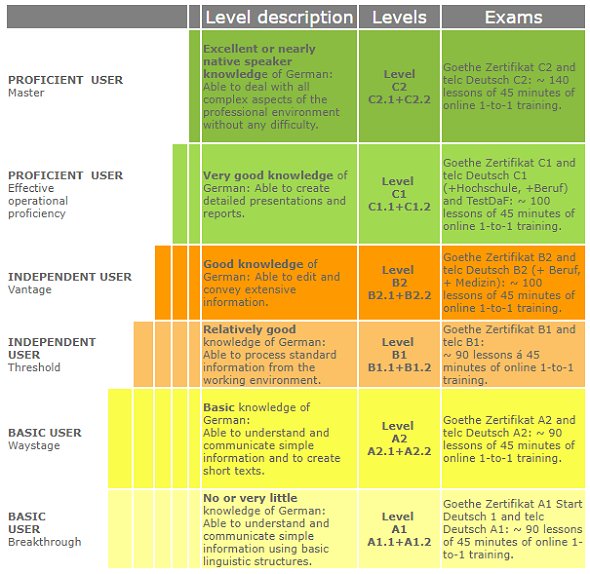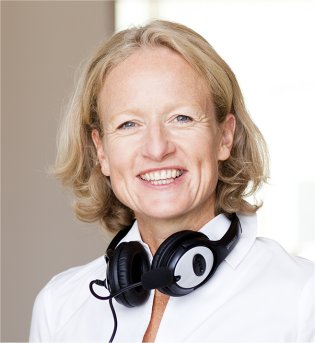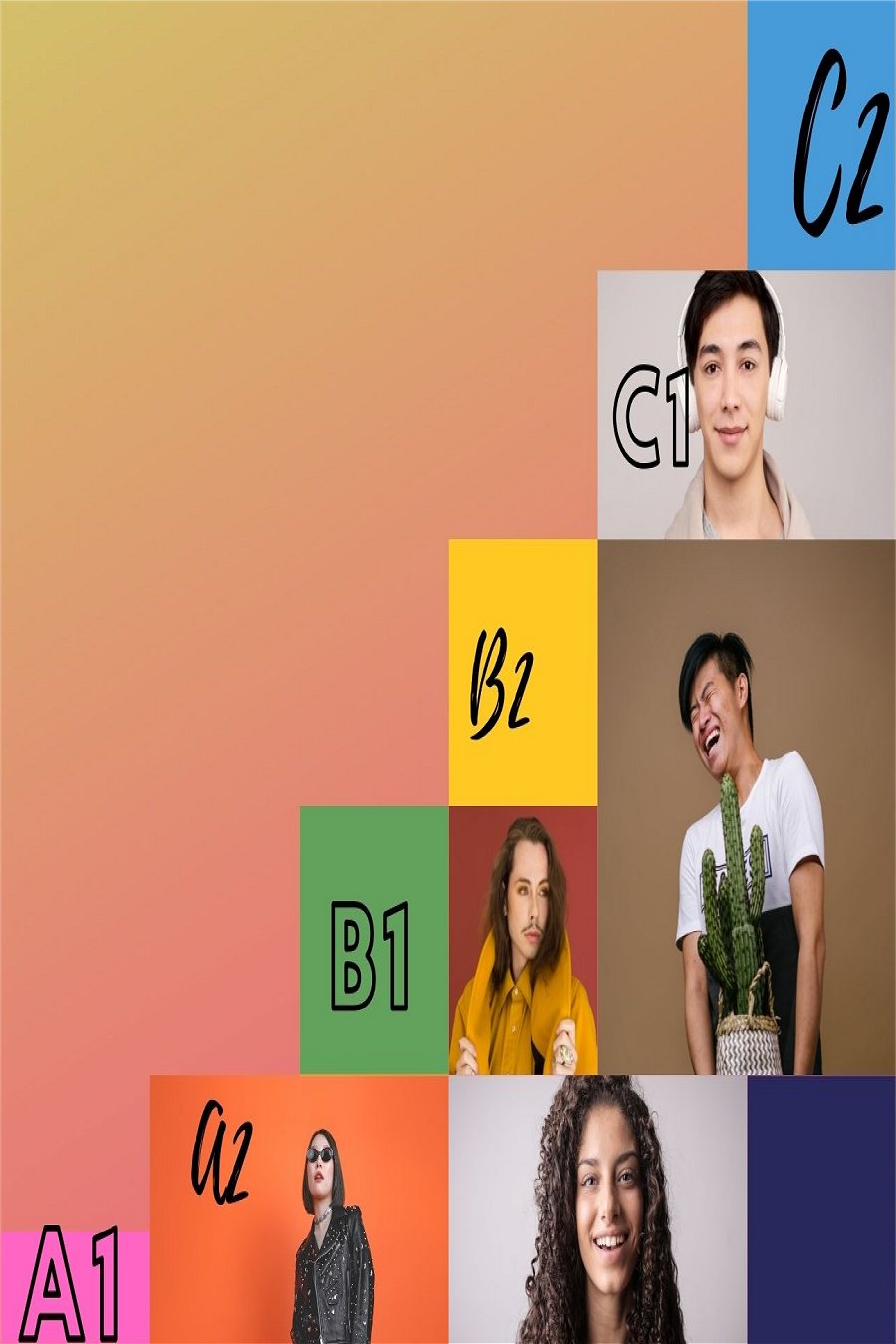LANGUAGE LEVELS AND CERTIFICATES
For a German course to be successful, the course content must be tailored to the level of the language learner. That’s why we consider it extremely important to evaluate the learner’s initial language level using a detailed placement test before the course begins. The following language level descriptors, based on the Council of Europe’s Common European Framework of Reference for Languages, provide a summary of the requirements for each level of proficiency. If you are unsure what level you have when you register, don’t worry. We will check your proficiency level through both the placement test and a short conversation via zoom or phone before the course starts.
The 3 main level groups are:
Each level group (A-B-C) is then divided into two levels: A1+A2, B1+B2 and C1+C2, resulting in a total of 6 language levels.

A1 – Beginner
Can understand and use familiar everyday expressions and basic phrases that focus on satisfying concrete needs. Can introduce themselves and others, and ask and answer simple questions such as: where they live, where they come from, what kind of people they know and what kind of things they have. Can communicate in a simple way in the present and the past, provided conversation partners are ready to help and speak slowly and clearly.
- The text books for level A1 are usually subdivided into A1.1 and A1.2
- Official exams for adults from 16+: telc Deutsch A1, Goethe Zertifikat A1: Start Deutsch 1
- Official exams for young people up to 16: telc Deutsch A1 Junior, Goethe Zertifikat A1: Fit in Deutsch 1
A2 – Basic knowledge
Can understand and use common expressions relating to areas of immediate importance (e.g. personal and family information, shopping, work, local surroundings). Can communicate in routine situations involving a simple and direct exchange of information about familiar topics. Can offer a simple description of their own background and education, the immediate environment and matters relating to current needs.
- The text books for the language level A2 are usually subdivided into A2.1 and A2.2
- Official exams for adults from 16+: telc Deutsch A2, Goethe Zertifikat A2
- Official exams for young people up to 16: telc Deutsch A2 Schule, Goethe Zertifikat A2: Fit in Deutsch
B1 – Intermediate language use
Can understand the principal points if standard language is used clearly and if the conversation focuses on familiar topics relating to work, school, leisure etc.. Can manage most situations encountered when travelling in a German speaking country. Can communicate easily and coherently on familiar topics and areas of personal interest. Can report on events and experiences, describe hopes, dreams and goals, and provide brief justifications or explanations for opinions and plans.
- The text books for the language level B1 are usually subdivided into B1.1 and B1.2
- Official exams for adults from 16+: telc Deutsch B1; Goethe Zertifikat B1
- Official exams for young people up to 16: telc Deutsch B1 Schule; Goethe Zertifikat B1
B2 – Independent language use
Can understand the principal content of complex texts on specific or abstract topics; can also understand technical discussions in their own area of expertise. Can communicate spontaneously and fluently, enabling a normal conversation with native speakers with minimal effort on both sides. Can express themselves clearly and in detail on a wide variety of topics, can explain a point of view on a current issue and state the advantages and disadvantages of various options.
- The text books for the language level B2 are usually subdivided into B2.1 and B2.2
- Official exams for adults from 16+: telc Deutsch B2, telc Deutsch B2+Beruf, telc Deutsch B2 Medizin Zugangsprüfung, telc Deutsch B2-C1 Medizin, Goethe Zertifikat B2
- A German proficiency level of B2 is generally viewed by employers as a good language level
C1 – Advanced language use
Can understand a wide range of demanding, longer texts and also recognize implicit meaning. Can express ideas spontaneously and fluently, without any obvious searching for words. Can use the language effectively and flexibly for social, professional and academic life. Can produce clear, well-structured detailed text on a range of complex subjects using appropriate means of textual linking.
- The text books for the language level C1 are usually subdivided into C1.1 and C1.2
- Official exams for adults from 16+: telc Deutsch C1, telc Deutsch C1 Beruf, Goethe Zertifikat C1, TestDaF
- A certified German proficiency level of C1 is a requirement to study at a German University (TestDaF and Telc Hochschule C1)
C2 – Proficient language use
Can easily understand virtually everything they read/hear. Can summarize information from a variety of spoken and written sources, reconstructing arguments and accounts in a coherent presentation. Can express themselves spontaneously, very fluently and precisely, differentiating finer shades of meaning even in the most complex situations.
- The text books for the language level C2 are usually subdivided into C2.1 und C2.2
- Official exams for adults from 16+: telc Deutsch C2, Goethe Zertifikat C2
- A certifed German proficiency level of C2 is required to teach in Goethe Institutes abroad
Please note that we can prepare for all German exams listed above. And if you attend our Home Tuition Program (living in the house of the teacher) in Bamberg, you can also take all telc exams and the TestDaF exam at our partner school here so you can conclude your language stay with an official exam. Just ask us!

I will help you identify your German level.
Contact
Alexandra von Rohr
Sprachinstitut TREFFPUNKT-ONLINE
Schellenberger Straße 20
D-96049 Bamberg / Germany
Phone: +49 951 20 44 04
Mobile: +49 179 518 4635
E-Mail: a.vonrohr@treffpunkt-online.com
Skype Call: german-online-teacher
WhatsApp message

